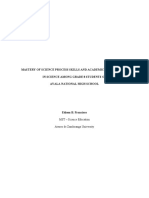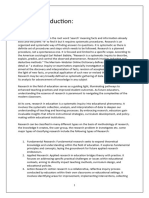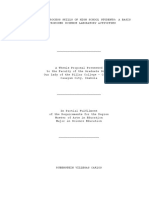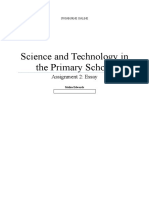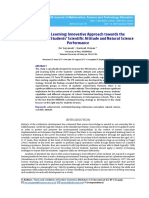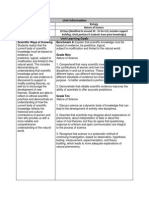018LLI DelaCruz JP PDF
018LLI DelaCruz JP PDF
Uploaded by
kristineCopyright:
Available Formats
018LLI DelaCruz JP PDF
018LLI DelaCruz JP PDF
Uploaded by
kristineOriginal Title
Copyright
Available Formats
Share this document
Did you find this document useful?
Is this content inappropriate?
Copyright:
Available Formats
018LLI DelaCruz JP PDF
018LLI DelaCruz JP PDF
Uploaded by
kristineCopyright:
Available Formats
Presented at the DLSU Research Congress 2015
De La Salle University, Manila, Philippines
March 2-4, 2015
Development of an Experimental Science Module to Improve Middle
School Students Integrated Science Process Skills
Jose Paulo C. dela Cruz
ACS Jakarta
jose.paulo@acsjakarta@sch.id
Abstract: A 7-week learning module was developed intended mainly for Grade 7 and 8 students who
need a beginning knowledge of scientific writing. This module puts Inquiry as the heart of learning
sciences and aims to support students understanding of sciences by providing them with
opportunities to independently investigate through both research and experimentation. The use of
open, student-led investigations alongside scaffolded teaching of research skills and the integration
of science process skills allowed students to learn what it means to do science, solve problems and
develop thinking skills. This experimental science module emphasized the use of the scientific
method in performing an investigation by experimentation (inquiry-based learning) to develop
critical thinking and science process skills. The students were given the opportunity to design and
execute experiments in a strategic and unified manner. As they go through their investigations they
were expected to master different Integrated Science Process Skills. To culminate their learning in
this module, the students were required to write a full science report. This study utilized a
research-validated paper-and-pencil test for assessing integrated science process skills developed by
Kazeni (2005). The test is consist of 30 multiple choice items that are content independent; and
gender, race, school type and location neutral. Comparing pre-test and post-test scores, 66% of the
students learned positively from the module. Item analysis of the test scores showed improvement
in the different integrated science process skills: 8% in identifying variables, 11% in stating
hypothesis, 16% in operationally defining variables, 8% in graphing and interpreting data, and 14%
in designing experiments. T-test for paired samples further revealed that students scored
significantly improved after going through the module.
Key Words: Inquiry-based Learning; Science Process Skills; Science Investigations
1. INTRODUCTION
A holistic view of 21st century teaching and
learning focuses on the discrete combination of 21st
century student outcomes (a blending of specific
skills, content knowledge, expertise and literacies)
with innovative support systems to help students
master the multi-dimensional abilities required of
them in the 21st century and beyond (Pacific Policy
Research Center, 2010).
21st century outcomes for todays students (Center
for 21st Century Skills). Science education should
focus on the development of scientific literacy to
enable understanding of the Nature of Science and
its relationship to society, rather than a focus that is
heavily weighted in content knowledge. This new
approach should enable students to engage in
thinking creatively, critically and constructively
around complex real world problems (Office of the
Prime Ministers Science Advisory Committee,2011;
International Baccalaureate Organization, 2014).
The purpose of science education today should be
aligned to produce a support system that produces
LLI-II-018
1
Proceedings of the DLSU Research Congress Vol. 3 2015
Presented at the DLSU Research Congress 2015
De La Salle University, Manila, Philippines
March 2-4, 2015
Learning sciences should develop students as
inquirers,
scientifically
literate,
caring
and
responsible individuals who will think critically and
creatively when solving problems and making
decisions about aspects affecting themselves, others
and their social and natural environments - it is
more than simply learning technical scientific
terminology. As student learns science they should
become competent and confident in accessing, using
and communicating scientific information. Students
are expected to use scientific language correctly and
select appropriate communication formats for oral
and written communication. They are also expected
to demonstrate critical-thinking skills to analyse and
evaluate information in order to make informed
judgments in a variety of contexts(Office of the Prime
Ministers Science Advisory Committee, 2011; Jugar,
R., 2013).
This 21st century purpose of science must be
relevant to the interests of students, providing them
with opportunities to explore the connections
between science and everyday life. Students are
encouraged to be interested in and engaged with the
role of science in the world. Through the
investigation of real examples of the application of
science, students gain insight into the tensions and
dependencies
between
science
and
societal,
environmental and ethical factors (Office of the
Prime Ministers Science Advisory Committee, 2011).
This simply puts Inquiry as the heart of learning
sciences
and
aims
to
support
students
understanding of sciences by providing them with
opportunities to independently investigate relevant
issues through both research and experimentation.
The use of open, student-led investigations
alongside scaffolded teaching of research skills and
the integration of science process skills allows
students at all levels to learn what it means to do
science, solve problems and develop thinking
skills[3]. Notably, these foundations are important
for students who are going to continue in science, as
well as for those who will not continue beyond
secondary school (International Baccalaureate
Organization, 2014).
The cognitive ability of creating meaning and
structure from new information and experience are
referred as science process skills. These skills are an
important and necessary means by which the learner
engages with the world and gains intellectual control
of it through the formation of concepts and
development of scientific thinking (Jugar, R., 2013).
LLI-II-018
Science - A Process Approach (SAPA), defined
science process skills as a set of broadly transferable
abilities, appropriate to many science disciplines and
reflective of the behavior of scientists. SAPA grouped
process skills into two types-basic and integrated.
The basic (simpler) process skills provide a
foundation for learning the integrated (more
complex) skills.
The Basic Science Process Skills are:
Observing. The use of the senses to gather
information about an object or event.
Inferring. The making an "educated guess"
about an object or event based on previously
gathered data or information.
Measuring.
The use of both standard and
nonstandard measures or estimates to describe the
dimensions of an object or event.
Communicating. The use of words or graphic
symbols to describe an action, object or event.
Classifying. The grouping or ordering objects or
events into categories based on properties or criteria.
Predicting. Stating the outcome of a future event
based on a pattern of evidence.
The different Integrated Science Process Skills
are:
Controlling variables. Being able to identify
variables that can affect an experimental outcome,
keeping most constant while manipulating only the
independent variable.
Defining operationally. Stating how to measure
a variable in an experiment.
Formulating hypotheses. Stating the expected
outcome of an experiment.
Interpreting data. Organizing data and drawing
conclusions from it.
Experimenting.
Being able to conduct an
experiment, including asking an appropriate
question, stating a hypothesis, identifying and
controlling variables, operationally defining those
variables, designing a "fair" experiment, conducting
the experiment, and interpreting the results of the
experiment.
Formulating models. Creating a mental or
physical model of a process or event.
Science process skills can be learned if taught in
a formally in the classroom with the use of proven
teaching methods. Furthermore, these skills can be
retained for future use if lessons are based on science
investigations and practiced over a long period of
time.
2
Proceedings of the DLSU Research Congress Vol. 3 2015
Presented at the DLSU Research Congress 2015
De La Salle University, Manila, Philippines
March 2-4, 2015
A science investigation emphasizes the use of the
scientific method in performing an investigation by
experimentation (inquiry-based learning) to develop
critical thinking and science process skills of the
student. This scientific method allows scientists to
collect and analyze data in a strategic and unified
manner and this is the same method that students
use to design and execute their project - they use the
same steps professional researchers use to gather
new information. The different science process skills
can be integrated in the conduct of science
investigations (Kazeni, 2005). Thus, science
investigations are giving students an opportunity to
undergo the process of conducting an investigation
using the scientific method making them gain a
considerable understanding of the nature of
obtaining solutions to problems or answers to
questions in a systematic and scientific way.
A 7-week learning module was developed
intended mainly for Grade 7 and 8 students who
need a beginning knowledge of scientific writing.
This module aims to support students understanding
of sciences by providing them with opportunities to
independently investigate through both research and
experimentation. The effect of this module to
students integrated science process skills
was
investigated.
2. METHODOLOGY
Development of the Experimental Science Module
This experimental science module was
developed to help students understand the basic
aspects of scientific inquiry and to provide students
with an opportunity to practice and refine their
critical-thinking skills. Middle school science class
offer an ideal setting for integrating many areas of
student interest. This module enables students to
participate in activities that integrate inquiry
science, physics, chemistry and biology. The context
of the modules classroom lessons is engaging, and
the science process skills gained can be applied
immediately to students courseworks and laboratory
practicals.
The Scientific Method and Science Process
Skills
a. Steps of the Scientific Method
1. Steps in the Research Process
2. Searching Scientific Literature
3. Evaluating Web Sources
LLI-II-018
Subjects
Two experimental science classes consisted
of 41 students were exposed to various science
investigations chosen by the teacher. Each class
followed a 7-week researcher-developed curriculum
and meets 7 periods in week. This experimental
science module emphasizes the use of the scientific
method in performing an investigation by
experimentation (inquiry-based learning) to develop
critical thinking and science process skills of the
student. The students are given the opportunity to
design and execute varied experiments in a strategic
and unified manner. As students go through their
investigations they are expected to master different
Science Process Skills such as Identifying and
Controlling
Variables,
Stating
Hypotheses,
Operational Definitions, Graphing and Interpreting
Data, and Experimental Design. Students were
required to submit a comprehensive written report
for each science investigation they performed.
Integrated Science Process Skills Test
This study utilized a research-validated
paper-and-pencil test for assessing integrated science
process skills developed by Kazeni (2005). The
science process skills tested by the instrument are:
identifying and controlling variables, stating
hypotheses, experimental design, graphing and
interpreting data and operational definitions. The
test is consist of 30 multiple choice items that are
Experimental Science Module Contents
I.
4. Citing Sources (APA Format)
b. The Integrated Science Process Skills
1. Identifying and Controlling Variables
2. Stating Hypotheses
3. Operational Definitions
4. Graphing and Interpreting Data
5. Experimental Design
II. Measurement and Laboratory Techniques
a. Safety in the Laboratory
b. Different Laboratory Apparatus and their
Uses
c. Measurement and Uncertainties
1. Principles of Experimentation
2. Measures of Central Tendencies
3. Systematic Errors
III. Writing the Science Investigation Report
a. Title and Research Question
b. Abstract
c. Introduction
d. Methods
e. Conclusion
f. References
3
Proceedings of the DLSU Research Congress Vol. 3 2015
Presented at the DLSU Research Congress 2015
De La Salle University, Manila, Philippines
March 2-4, 2015
content independent; and gender, race, school type
and location neutral. For this study, some proper
nouns were changed to a more locally family names
to make the test more culturally valid.
Test Administration and Analysis
The integrated science process test was
administered to students before and after they finish
the 7-week module. To identify students mastery of
each science process skill, an item analysis was
carried out for each item in the test.
stating hypotheses where they only have skill level
of developing proficiency. It can be noted that 8% of
the students learned the skill of identifying
variables, 11% acquired the skill of stating
hypotheses, 16% learned skill of operationally
defining variables, 8% acquired the skill of graphing
and interpreting data, and 14% learned the skill of
designing experiments.
Mastery for each item was determined by:
M = %Post - %Pre
(Eq. 1)
where:
M= Percentage of Mastery; Learning occurred
%Post= Percentage of students who are correct in the
post-test
%Pre= Percentage of students who are wrong in the
pre-test
Students proficiency levels were also interpreted
as follows:
50%
beginner,
51-60%
developing proficiency,
61-75%
proficient , and
76%
advanced proficiency.
Positive learning was determined by computing
the percentage of students who improved their
integrated science process test after they underwent
through the module.
The mean of students pre-test and post-test
scores were compared using t-Test for paired two
samples of means to determine if students
significantly improved their integrated science
process skills.
3. RESULTS AND DISCUSSION
After 7-weeks of learning the module, the
students reached an advanced proficiency level of
almost all the integrated science process skills except
for stating hypotheses in where they only reached the
proficiency level. Statistical analyses through t-Test
for paired two samples of means reveal that students
significantly improved their stating hypotheses,
graphing and interpreting data and designing
experiment skills but did not significantly improved
their identifying and operationally defining variables
skills.
Students moderate mastery and high proficiency
levels can be attributed to the fact that they already
have the opportunities to learn about science process
skills through some courses and subjects that cover
some of the skills without teaching them under the
concept of science process skills (Al-Rabaani, 2014).
Overall Integrated Science Process Skills Proficiency
Levels
Integrated Science Process Skills
Figure 1 shows the performance of the students
in each skill tested through the Integrated Science
Process Skills Test.
Science process skills are
defined as a set of broadly transferrable abilities that
reflect the behavior of scientists.
Even before the students went through the
module, they already have at least proficient level of
the integrated science process skills except for
LLI-II-018
Fig. 1. Mean percentage of students performance for
each science process skills
Overall Analyses of students proficiency level
reveal that more students after going through the 7week module reached advanced proficiency.
Comparing pre-test and post-test scores, 66% of the
students learned positively from the module.
Statistical analysis of students overall scores showed
that students of the experimental science module
significantly improved their scores in the integrated
4
Proceedings of the DLSU Research Congress Vol. 3 2015
Presented at the DLSU Research Congress 2015
De La Salle University, Manila, Philippines
March 2-4, 2015
science process skills test. It can be inferred that
students exposed to the experimental science module
had the opportunity to identify variables, state
hypotheses, operationally define variables, graph and
interpret data and design experiments as they
involve themselves in the science investigation
activities.
Fig. 2. Students integrated science process skill
proficiency levels
Various studies showed that inquiry-based
teaching approaches enhanced students science
process skills which are in agreement with the
findings of this study.
Numerous studies also
revealed the positive effects of science process skills
on scientific creativity, academic achievements and
attitude towards science.
Science investigations utilize inquiry-based
learning as its framework. As students conduct an
investigation using the scientific method they gain
an understanding of the nature of obtaining solutions
to a problem in a systematic way.
Doing science investigations develop students
natural curiosity. They acquire the skills necessary
to conduct inquiry and research and show
independence in learning. They exercise initiative in
applying thinking skills critically and creatively to
pose and approach complex problems, identify
variables, design appropriate experiments and make
reasoned conclusions. This inquiry-based approach
in learning allows the students understand science
by operational defining variables in the context of
their investigation. They are able to express ideas
and information confidently and creatively in a
variety of modes of communication such as graphs,
written and oral presentations. This activity also
allows them work effectively and willingly in
collaboration with others.
LLI-II-018
By doing student-led investigations, the students
are enable them to manage their time in order to
accomplish all tasks within the set deadlines.
Collaborating with their partners to critically and
positively analyze ideas and constant communication
with the teacher, enable them to produce outstanding
outputs.
They are able to effectively and
independently conduct literature reviews from
different sources using different forms of
technologies. Their knowledge and understanding
are effectively transferred and communicated to solve
the problem at hand. This activity enabled them to
reflect and think of ideas to make a plan, present
arguments in a logical sequence, identify problems
and evaluate available solutions, and create
strategies to solve the problem different perspectives.
It is important to note that the success of the
approach may depend on the competence,
enthusiasm, and confidence of the science teacher
and the ability of the students in making use of the
opportunity provided (Abungu et.al., 2014). Student
generated questions play an important role in
inquiry-based science classrooms. However, science
teachers know how to use students questions to
guide instruction (Gibson and Chase, 2002).
4. CONCLUSIONS
The researcher-developed experimental science
module emphasize on the development of science
process skills and scientific knowledge as its major
objectives to give varied opportunities to young
scientists to acquire knowledge and skills for solving
problems. Students proficiency in their integrated
science process skills is significantly improved after
going through the 7-week module.
Further research is needed to compare results
reported in this study to other inquiry-based
programs. Second, additional studies are needed that
follow students for longer periods of time after they
take the experimental science module. It would be
enlightening to determine the impact of module
designed for middle school students have on
students streaming choices. And nally, while
students showed a high level of proficiency in the
integrated science process skills test, further studies
should examine the correlation of among students
interest in science, their understanding of science
and their science process skills.
5
Proceedings of the DLSU Research Congress Vol. 3 2015
Presented at the DLSU Research Congress 2015
De La Salle University, Manila, Philippines
March 2-4, 2015
6. REFERENCES
Abungu,et.al., H. (2014). The effect of science
process skills teaching approach on secondary
school students achievement in chemistry in
nyondo district, kenya Journal of Educational
and Social Research (4)(6).
Al-Rabaani, A. (2014). The acquisition of science
process skills by omanis pre-,service social
studies teachers European Journal of
Educational Studies.
Center for 21st Century Skills. Six Critical Skills
that Form the Foundation for 21st Century
Success. www.p21skills.org accessed May 15,
2014.
Gibson, H. & C. Chase. (2002). Longitudinal Impact
of an Inquiry-Based Science Program on Middle
School Students Attitudes Toward Science.
Wiley Periodicals, Inc.
International Baccalaureate Organization.
Years Programme Sciences guide.
United Kingdom.
Middle
2014.
Jugar, R. (2013). Teacher-coaches perspectives on
the validity and
acceptability of commercial
laboratory testing and analysis of high school
science investigatory projects, Procedia-Social
and Behavioral Sciences, p. 2516-2521, 2013].
Kazeni, M. (2005). Development and validation of a
test of integrated science process skills for the
further education and training learners,
unpublished.
Office of the Prime Ministers Science Advisory
Committee (2011). Looking Ahead: Science
Education for the Twenty-First Century. A
report from the Prime Ministers Chief Science
Advisor. New Zealand.
Pacific Policy Research Center (2010). 21st Century
Skills for Students and Teachers. Honolulu:
Kamehameha Schools, Research & Evaluation
Division.
LLI-II-018
6
Proceedings of the DLSU Research Congress Vol. 3 2015
You might also like
- Participation of Grade 8 Students in Performing Science Investigatory Project of Maabud National High SchoolDocument10 pagesParticipation of Grade 8 Students in Performing Science Investigatory Project of Maabud National High Schoolbangtannie 07No ratings yet
- Raniel-Cueto-Chapter-1-3-with-comments-and-suggestionsDocument39 pagesRaniel-Cueto-Chapter-1-3-with-comments-and-suggestionsrazzelngpinasNo ratings yet
- Razzel Bason Chapter 1-3Document11 pagesRazzel Bason Chapter 1-3Raniel CuetoNo ratings yet
- Science Process Skills and Academic AchiDocument53 pagesScience Process Skills and Academic AchiDenferson ZurbanoNo ratings yet
- Guiding Principles For Effective Science and Technology/Engineering EducationDocument7 pagesGuiding Principles For Effective Science and Technology/Engineering EducationGellirose S. BantayanNo ratings yet
- DG5 Chapter1Document41 pagesDG5 Chapter1Althea JulitNo ratings yet
- Nature of Science TASK 2Document6 pagesNature of Science TASK 2Alfredo T. BakiaoNo ratings yet
- Sci WsDocument26 pagesSci WsAndrewNo ratings yet
- Raniel Cueto Chapter 1-3 With Comments and SuggestionsDocument13 pagesRaniel Cueto Chapter 1-3 With Comments and SuggestionsRaniel CuetoNo ratings yet
- Application of Science in Everyday LifeDocument31 pagesApplication of Science in Everyday LifePaulene BautistaNo ratings yet
- Republic of The Philippines Region I Urdaneta City PangasinanDocument8 pagesRepublic of The Philippines Region I Urdaneta City PangasinanMark Jay BongolanNo ratings yet
- Chapter 1 PDFDocument9 pagesChapter 1 PDFEdz FranciscoNo ratings yet
- Ej 1145588Document11 pagesEj 1145588bioceejlibraryNo ratings yet
- The Effectiveness of Students' Worksheet Based On Multiple Representations To Increase Science Process SkillsDocument9 pagesThe Effectiveness of Students' Worksheet Based On Multiple Representations To Increase Science Process SkillsbalqismutiaNo ratings yet
- Issues With Science Education and Student Disengagement: Sally HowardDocument12 pagesIssues With Science Education and Student Disengagement: Sally HowardreiNo ratings yet
- Pnpa ReviewerDocument21 pagesPnpa ReviewerSeth Jeffrey Cabilona CruzalentiñoNo ratings yet
- A Study of Science Process Skills of Secondary School StudentsDocument10 pagesA Study of Science Process Skills of Secondary School StudentsAnonymous CwJeBCAXpNo ratings yet
- LESSON 1 To 3 SCIENCEDocument51 pagesLESSON 1 To 3 SCIENCECasey Dela FuenteNo ratings yet
- Strategies For Mastering Science Process Skills and Manipulative Skills in Practical WorkDocument12 pagesStrategies For Mastering Science Process Skills and Manipulative Skills in Practical Workhisgraceto1960No ratings yet
- Best Practice in Elementary ScienceDocument5 pagesBest Practice in Elementary ScienceJhelai OconNo ratings yet
- Action Research Scientific DiagramDocument32 pagesAction Research Scientific Diagramrplmhzrk17No ratings yet
- K12 Science Grade 3 - Grade 10 Curriculum GuideDocument67 pagesK12 Science Grade 3 - Grade 10 Curriculum GuideDepEdResources88% (24)
- Science and TechnologyDocument9 pagesScience and TechnologyanjumNo ratings yet
- Module-1 (Science)Document9 pagesModule-1 (Science)Jessa SumagaysayNo ratings yet
- Doing More Science With PeopleDocument26 pagesDoing More Science With PeopleAndrewNo ratings yet
- ELE02 Learning Task 2.midtermDocument4 pagesELE02 Learning Task 2.midtermMichele VelascoNo ratings yet
- Local Media5766598185496389114Document7 pagesLocal Media5766598185496389114Zoey LedesmaNo ratings yet
- CHAPTER I V RevisedDocument82 pagesCHAPTER I V RevisedGwen LopezNo ratings yet
- Jurnal Independent T Test Two Way AnovaDocument7 pagesJurnal Independent T Test Two Way AnovapradekaNo ratings yet
- Utah Elementary Science Core Curriculum Third Grade Adopted by Utah State Board of Education March 12, 2002Document9 pagesUtah Elementary Science Core Curriculum Third Grade Adopted by Utah State Board of Education March 12, 2002christineshoresNo ratings yet
- Process SKills Full PaperDocument134 pagesProcess SKills Full PaperNhelia Santos BañagaNo ratings yet
- Besbio 3Document24 pagesBesbio 3Geraldine PalaciosNo ratings yet
- Assignment 2 EssayDocument7 pagesAssignment 2 Essayapi-339908787100% (2)
- Multimodal Representations Strategies in Teaching Science Towards Enhancing Scientific Inquiry Skills Among Grade 4Document12 pagesMultimodal Representations Strategies in Teaching Science Towards Enhancing Scientific Inquiry Skills Among Grade 4IOER International Multidisciplinary Research Journal ( IIMRJ)No ratings yet
- Position Statement On Disciplinary Literacy in ScienceDocument6 pagesPosition Statement On Disciplinary Literacy in Scienceapi-340726722No ratings yet
- Spstem Science3-10 V2Document82 pagesSpstem Science3-10 V2stephaniemae.lanzaderasNo ratings yet
- Final Output 3isDocument51 pagesFinal Output 3isRonel AdarloNo ratings yet
- 5 DR Kartini BadariahDocument13 pages5 DR Kartini BadariahSabrizalNo ratings yet
- E10Q1LAS1 - Introduction To ResearchDocument4 pagesE10Q1LAS1 - Introduction To ResearchBenedict Joshua S. DiaganNo ratings yet
- The Role of Cooperative Instructional Strategies On Integrated Science Process SkillsDocument6 pagesThe Role of Cooperative Instructional Strategies On Integrated Science Process SkillsIJAR JOURNALNo ratings yet
- Science Integration in Alternative Learning System Basis For An Enriched Basic Science Process Skills and Science AttitudeDocument11 pagesScience Integration in Alternative Learning System Basis For An Enriched Basic Science Process Skills and Science AttitudeAPJAET JournalNo ratings yet
- Stds Life ScienceDocument12 pagesStds Life ScienceJennifer Rainey (CHMS)No ratings yet
- Developing Creativity Through STEM EducationDocument6 pagesDeveloping Creativity Through STEM Educationuicci jakartaNo ratings yet
- Process Skills and Attitudes of Grade Eleven Stem Students Toward Biology at Victoria National High School A Descriptive StudyDocument7 pagesProcess Skills and Attitudes of Grade Eleven Stem Students Toward Biology at Victoria National High School A Descriptive StudyInternational Journal of Innovative Science and Research TechnologyNo ratings yet
- Exam 1 Week 3Document4 pagesExam 1 Week 3Darlhen LigaligNo ratings yet
- My Final Research PaperDocument23 pagesMy Final Research PaperyenpalerNo ratings yet
- Contextual LearningDocument16 pagesContextual LearningClaudia Atig100% (1)
- Khery - 2020 - J. - Phys. - Conf. - Ser. - The Influence of Mobile-NOS Model of Learning Towards Students Understanding On The Nature of Science PDFDocument7 pagesKhery - 2020 - J. - Phys. - Conf. - Ser. - The Influence of Mobile-NOS Model of Learning Towards Students Understanding On The Nature of Science PDFYusran KheryNo ratings yet
- Parent News Letter ScienceDocument4 pagesParent News Letter Scienceapi-606355723No ratings yet
- 2014-2015 Y3 - Unit 1 - NosDocument9 pages2014-2015 Y3 - Unit 1 - Nosapi-261270342No ratings yet
- Edsci 2 BeedDocument40 pagesEdsci 2 Beedprincess julie ann bayogosNo ratings yet
- Cakrawala Pendidikan, Vol. 38, No. 2, June 2019: Doi: 10.21831/cp.v38i2.23345Document10 pagesCakrawala Pendidikan, Vol. 38, No. 2, June 2019: Doi: 10.21831/cp.v38i2.23345Donatus JustinNo ratings yet
- Movement Based Instruction in Improving Basic Science Process Skills of Grade 6 PupilsDocument15 pagesMovement Based Instruction in Improving Basic Science Process Skills of Grade 6 PupilsArthur NierraNo ratings yet
- Science Process Skills and Attitudes Toward Science Among Palestinian Secondary School StudentsDocument13 pagesScience Process Skills and Attitudes Toward Science Among Palestinian Secondary School StudentsJeffrey SarmientoNo ratings yet
- Unit 2 Wa Educ 5272-1Document6 pagesUnit 2 Wa Educ 5272-1TomNo ratings yet
- Thesis Chapter 1Document10 pagesThesis Chapter 1Maria Camille Villanueva SantiagoNo ratings yet
- Khery DKK, Do Understanding Nature of Science (Nos) Play Role To Prosiding ICMScE 2019 PDFDocument9 pagesKhery DKK, Do Understanding Nature of Science (Nos) Play Role To Prosiding ICMScE 2019 PDFYusran KheryNo ratings yet
- Output 1 Integrated Approaches and Technology in Teaching ScienceDocument3 pagesOutput 1 Integrated Approaches and Technology in Teaching ScienceNoralyn SultanNo ratings yet
- The Problem and Its BackgroundDocument6 pagesThe Problem and Its BackgroundArnel GutierrezNo ratings yet












